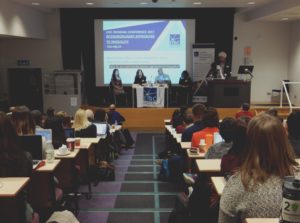Blog
Tackling Global Inequality: Interdisciplinary Perspectives
Written by LIDC
May 2, 2017
At the The LIDC Biennial Conference on ‘Interdisciplinary Approaches to Inequality’ in April we had an afternoon of parallel sessions on a range of issues including Health and Nutrition, Education, Corruption, Linguistics and Economics and Infrastructure. Here is a sum up of the key points of each session and the issues and solutions discussed. Find recordings of the Keynote talks and panel session of the event here.
Session 1: ‘Inequality in Nutrition and Health’
Speakers: Prof. Jeff Waage, LCIRAH, Dr Barbara Haesler, Royal Veterinary College (RVC), Dr. Fiorella Picchioni (SOAS) and Dr Elizabeth Hull (SOAS)
- Food price crises can exacerbate already existing negative links between poverty, inequality and nutrition by changing people’s working patterns, food intake, care, and family and social relations.
- A food economy that reflects the true costs of food (including health, environmental and other negative extremities) would self-regulate some of the current inequalities (e.g. dumping cheap, unhealthy food in the South, patronising subsidies; dominance of big agribusiness.
- The example of inequality in food systems in South Africa given by the speakers shows that an anthropological approach to studying the historical perspective allows for a deeper understanding of inequalities in the system, which are often structurally entrenched. Such knowledge is critical to create effective policies.
Session 2: ‘Inequality, Financialisation and Systems of Provision’
Speakers: Dr Kate Bayliss, SOAS and Dr Jasmine Gideon, Birkbeck
- The importance of intersecting inequalities (gender, race, age, disability) can’t just be addressed by giving money targeted at providing services without better insights into how inequalities constrain access in the first place.
- There are challenges of regulating the private sector, especially in low-income countries. If there is weak regulation, there is a greater risk of financial extraction (i.e. money taken is accumulated by the private sector) and capital outflows.
- PPPs can lead to the provision of services or facilities but may not lead to ‘better’ jobs within the service, or be located where most needed.
Session 3: ‘Taking on Inequality to Tackle Poverty’
Speakers: Àlex Prats, Inequality Lead, Oxfam and Dr Carlos Oya, SOAS
- Each context requires specific policy measures. There is not one that fits all.
- The relationship between poverty and inequality is confusing and it depends on what measures are being considered.
Session 4: ‘Infrastructure and Inequality’
Speakers: Dr Christopher McDowell, City University of London and Prof. Edward Simpson, SOAS
- Infrastructure reconstructs society in counter-intuitive ways. It can bring about social reconstruction but not equality. We tend not to anticipate its long term impact.
- Resettlement is key to the development of infrastructure. What mechanisms can be put in place to make reconstruction inclusive? i.e. a future to address the harms of land acquisition
- Is infrastructure about infrastructure or social visions and inauguration?
Session 5: ‘SOAS ACE Panel: Corruption and Inequality’
Speakers: Dr Antonio Andreoni, SOAS, Dr Dina Balabanova, LSHTM, Dr Scott Newton, SOAS, and Prof Alena Ledeneva, UCL
- Corruption and inequality are interdependent.
- Informal and illicit practices in health can be harmful for health and equality. These occur even in Universalist systems; in this case collective strategies are useful to tackle corruption.
Session 6: ‘Education and Inequality’
Speakers: Dr Tristan McCowan, UCL IOE and Dr Deborah Johnston, SOAS
- How do we conceptualise equality in education? Does it imply equality in access to education or that in educational achievement/output e.g. degree attainment, certification, awards?
- Education can also be seen as a multiplier in terms of financial investment. One which leads to greater employment opportunities and avenues for improving living standards and acquiring upward social mobility.
- Should educational policies prioritize early years education or tertiary education? While the former is built upon the integration of millions of out-of-school children into the education system, the latter yields experts and specialists who contribute to economic growth.
Session 7: ‘Inequality in Local Language Use: Linguistic lessons from humanitarian interventions in the Ebola crisis’
Speakers: Dr Mandana Seyfeddinipur, SOAS, and Nicholas Mellor, Director of MiiHealth Ltd and Co-founder of Merlin
- Language is inseparable from communication and it is linked to trust and empathy.

